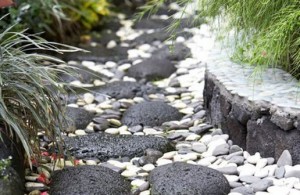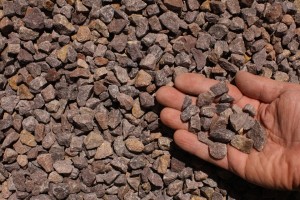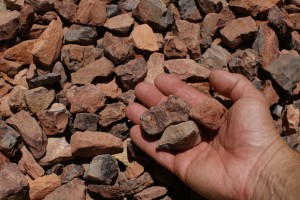 “To mulch or not to mulch” is a question that many landscapers and homeowners have eliminated from their vocabulary. How? By going another route, the natural stone route.
“To mulch or not to mulch” is a question that many landscapers and homeowners have eliminated from their vocabulary. How? By going another route, the natural stone route.
The pros and cons of using stone, crushed stone, otherwise known as gravel, or natural wood mulch are many. Today, however, a growing number of landscapers and homeowners are opting for stone landscapes depending on the property and individual preferences.
Hint: Before making a choice as to which way to go, we highly recommend that you first research what your options are and consult one of our Melvin Mulch experts.
That being said, let’s look first at the pros of having a stone-based ground covering as opposed to natural, wood mulch.
Less Maintenance: Depending on the geographic region in which the homeowner resides, mulch may need to be re-applied sometimes several times a year as it will decompose, fade and deteriorate from its original state. In contrast, stone or gravel covering rarely needs a re-application. Moreover, weeds tend to not break through stone coverings as easily as they do through wood mulch.
Visual Curb Appeal: There is nothing more beautiful, nor smells as well, as freshly laid mulch covering. However, mulch doesn’t maintain that attractive look for long. In contrast, stone can last for several years. Gravel does have a tendency to disintegrate under the weight of autos if it is used as a driveway covering–after a few years.
Great as a ground covering around pool areas and surrounding patio areas, stone ground covering is a good choice for some areas in which running water is prone to wash out both mulch and soil.
Discourages Fungal Growth: Generally, fungus doesn’t like stone, as it cannot receive nourishment from this natural material. This can be especially important if living in a humid climate with a lot of rainfall, or where accumulated water tends to gather, either by nature or when using a garden hose.
The Downside To Stone Ground Covering
As with everything in life, there is another side of the proverbial coin. As such, the two largest downsides to having a crushed stone, gravel or stone ground coverings are: cost and a reduced retention of moisture.
Cost: Ranging from 50 percent to 75 percent more than average bags of mulch, the increased weight and logistics to moving bags or barrels of stone can add to the cost of installation and the labor involved. That being said, the costs are up-front and won’t be repeated until years after the initial installation–if at all.
Reduced Moisture Retention: Typically, soil that lies underneath mulch tends to hold and support more water than stone. This can be a good thing on one hand as this helps nourish the soil; however, it can also cause grass fungus to grow in areas that retain too much water. Stone will not have this problem as it doesn’t retain water.
Today’s Stone In The Market Place
With today’s large assortment of stones coming in various sizes such as large stones, crushed stone or even smaller-sized gravel, landscapers and homeowners will enjoy making their selections as to preferred colors and shapes as well. Any one of our Melvin Mulch landscape experts can readily answer your questions about using stone ground covering for your next landscape project.
Top photo by stonescape from Flickr using Creative Commons license

